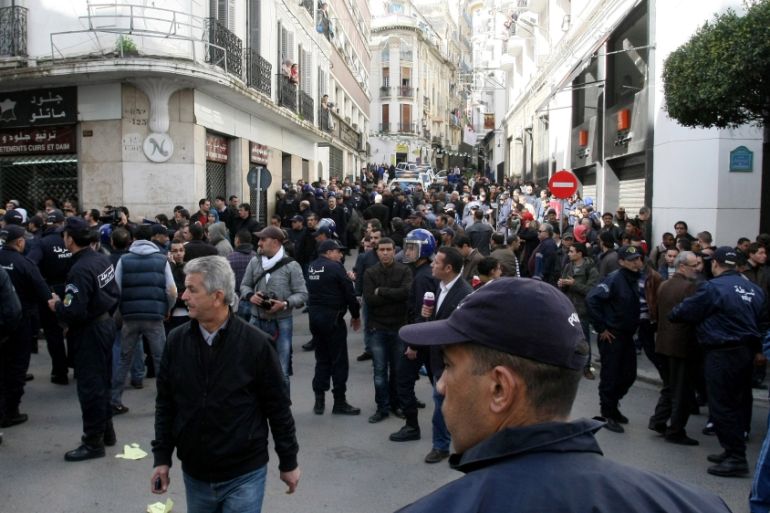‘Two Algerias’: Country gripped by economic debate
Algeria’s recent Fikra conference explored how to bring globalisation to the beleaguered state.

Algiers – Amid a global collapse in oil prices, Algeria, which derives 30 percent of its gross domestic product and 60 percent of government revenues from energy, faces the challenging task of diversifying its economy.
Last month, as protests against shale gas development erupted in Algeria, Prime Minister Abdelmalek Sellal announced on state television that the country could face a crisis amid plunging income from exports. Algerians have known for years that they could not always depend on energy to sustain the economy, but leaders have done little to build up alternatives through foreign investment, critics say.
“Foreign investment is not one of the priorities of the country when it should be,” businessman Slim Othmani, who heads a think tank called Club of Action and Thinking Around Enterprise, told Al Jazeera. “The climate isn’t favourable for these kind of changes. But many experts and Algerians want the government to be more pragmatic and more open to the world.”
RELATED: Eroding Algeria’s political status quo
Othmani said Algeria’s economy has traditionally been closed to foreign investment for cultural reasons; mainly the country’s experience under French colonialism that forced it to isolate itself from foreign influences. But foreign investors have also eschewed the country because politicians have not enticed them to local markets and industries with reforms.
We need some kind of earthquake to shake and revive the country.
But Algerians wonder why their country, a geographically massive country of almost 40 million people with some of the largest natural gas and oil reserves in the world, does not play a larger role in the world economy. Many observers believe Algeria’s relatively modest place in the world reflects a lack of political will to change that status.
Some of these issues were explored at a recent conference aiming to “bring globalisation” to Algeria, which ultimately turned into a forum to address the country’s dire economic situation. The TED-style Fikra (idea in Arabic) conference last month brought together hundreds of young Algerians, economists, entrepreneurs and businesspeople at the Aurassi hotel, which overlooks the city.
“We can see the drop of oil prices as an incentive for people,” Toufik Lerari, the event’s cofounder, told Al Jazeera. “People are happy to come and meet journalists, businessmen and get a unique chance to connect.”
Lerari expressed a desire to globalise Algeria, a country that has been relatively closed to the rest of the world culturally, politically, and economically. Following its liberation war in 1962, Algeria has embraced a protectionist attitude due to its socialist tradition.The situation has led many young people to crave more access and interaction with the rest of the world after years of political inertia and battles against terrorism.
RELATED: Algerian youth speak out ahead of vote
Indeed, Fikra was an unusually optimistic event in Algeria. While some criticised the disconnect between the conference’s lofty goals of empowering youth and the gloomy reality of Algeria – unemployment has remained at about 10 percent since 2010 and is significantly higher for youth (24.8 percent) and among women (16.3 percent) – others applauded the hopefulness of the presentations and the rare opportunity to network.
“I only came here to connect with my friends,” one young woman, who declined to provide her name, told Al Jazeera. “But this bright and optimistic depiction of Algeria is far from reality.”
|
|
| Algeria: The revolution that never was |
Lerari was unapologetic, noting: “I am not a photographer; I am not taking a photo of Algeria. I am creating a stimulating place to encourage moving forward.”
Conference speakers addressed a number of issues that young Algerian entrepreneurs face when trying to launch their own businesses – especially funding. The country cultivates its large-scale industries, such as oil drilling, but not start-ups that provide new services that could open new markets and cater to new tastes, Othmani said.
“The country is stuck in old, administrative ways,” he said. “These young people with ideas are not supported by the state or by banks. The banking system is still archaic and banks don’t really have the option to be very creative.”
Book publisher Dalila Nadjem, who grew up in France but spent the last couple of decades in Algeria, told Al Jazeera that the country’s struggle against terrorism in the 1990s has profoundly marked Algerian society. Residents are still slowly recovering from that painful history, she added.
“I feel like there are two Algerias – one that we see today that is open to the world, and one that is accepting [of the current situation],” Nadjem said. “People need to start going out again and having fun. We need some kind of earthquake to shake and revive the country.”